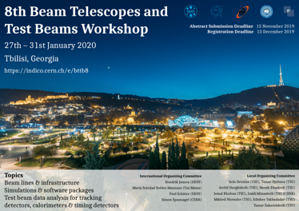Speaker
Description
Particle detectors for operation at future high-energy collider experiments are designed in view of both their facilities' physics objectives and their experimental conditions, which differ substantially between lepton and hadron colliders as well as between linear and circular colliders. Example differences are background conditions and duty cycles at these colliders, which for instance translate into very different requirements in terms of shielding, radiation hardness requirements and cooling concepts. Furthermore the detector designs take into account cost and engineering constraints as well as anticipate future technology developments. An overview of the physics cases and experimental environments of the currently proposed future high-energy colliders (CEPC, CLIC, FCC, ILC and muon colliders) is given. The corresponding detector design choices are discussed and it is outlined how further detector-design optimisation is pursued. Synergies between future detector projects and already approved HEP experiments and their upgrades are outlined as well as activities in dedicated detector R&D collaborations.




